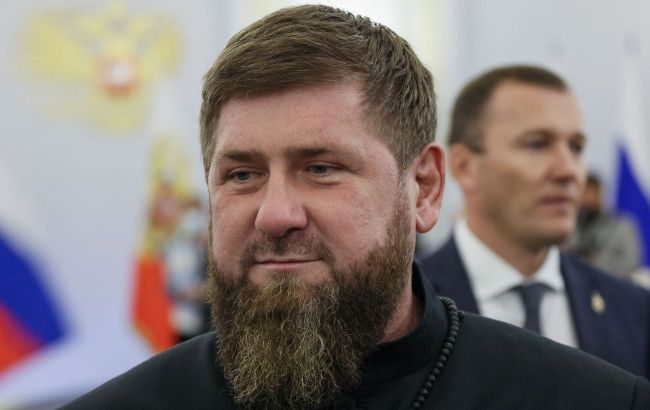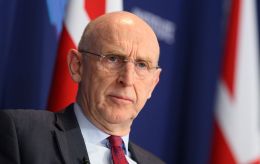Kadyrov struggles to balance Chechnya and Kremlin support - ISW
 Head of Chechnya, Ramzan Kadyrov (photo: GettyImages)
Head of Chechnya, Ramzan Kadyrov (photo: GettyImages)
The Kremlin's support for the ultra-nationalist Russian Orthodox religious ideology appears to complicate the ability of Ramzan Kadyrov, the head of the Chechen Republic, to balance between appealing to his Chechen Muslim constituents and maintaining favor with the Kremlin, according to the Institute for the Study of War (ISW).
On October 24, Kadyrov made an inconsistent and potentially provocative internal religious statement. This hinted at his efforts to reconcile his fervent support for Russian President Vladimir Putin, who has often presented himself as a true defender of Orthodox faith, and Kadyrov's own persona as a devout representative of Chechnya's Islamic values.
Notably, Kadyrov's son, Adam, recently sparked significant controversy in Russia after Ramzan promoted videos where his son physically abused an individual accused of Quran desecration.
On October 24, the heads of the Republic of Tatarstan, Rustam Minnikhanov, and the Karachay-Cherkess Republic, Rashid Temrezov, awarded Adam Kadyrov for his contributions to "interethnic and interregional unity" and for strengthening traditional Islamic values. Kadyrov used this occasion to further praise his son, despite criticism of Adam's actions.
Subsequently, Kadyrov, likely attempting to mitigate potential negative consequences of supporting his son's violence, publicly announced the opening of an Orthodox church in Chechnya, alongside Viktor Zolotov, the head of the Russian National Guard, on October 25.
However, Kadyrov instantly undermined any informational effect he could have created during these actions by announcing the formation of the Sheikh Mansur volunteer battalion.
This declaration caused outrage among Russian ultra-nationalists since Sheikh Mansur is also the name of a volunteer battalion composed of Chechen and Ichkerian volunteers who fight for Ukraine. It is also noted that Sheikh Mansur was a Chechen fighter from the 18th century who opposed Russian imperial rule.
"Likely, Kadyrov will continue to provoke the anger of Russian ultra-nationalists, who are increasingly opposing migrants mainly from Muslim-majority Central Asian countries and other religious minorities in Russia, with his persistent efforts to appeal to his core Muslim electorate," noted ISW.
Key findings:
-
Ukrainian forces made slight advances in the western Zaporizhzhia region and continued their offensive near Bakhmut on October 25.
-
Russian forces advanced in the Avdiivka area on October 25, confirming the offensive.
-
On October 25, Russian sources reported that Ukrainian forces resumed larger-than-usual ground operations on the eastern (left) bank of Kherson Oblast and held positions in several areas on the eastern bank. However, only a few Russian sources currently claim that Ukrainian forces have resumed larger-than-usual ground operations on the eastern bank.
-
Ukrainian President Volodymyr Zelenskyy stated that Ukrainian forces are preparing for Russia's autumn-winter offensive campaign in Ukraine following a new series of Russian drone strikes on the night of October 24-25.
-
Russian Minister of Defense Sergey Shoigu visited the command post of the Eastern Group of Forces on the southern Donetsk direction (in the area near the Donetsk-Zaporizhzhia region border) on October 25.
-
On October 25, the Russian Ministry of Defense confirmed that Lieutenant General Andriy Kuzmenko is the commander of the Russian Eastern Group of Forces, and it likely confirmed his position as the commander of the Eastern Military District (EMD) as well.
-
The Kremlin's support for ultra-nationalist Russian Orthodox religious ideology appears to complicate the ability of Ramzan Kadyrov, the head of the Chechen Republic, to balance between appealing to his Chechen Muslim constituents and maintaining favor with the Kremlin.
-
Russian forces conducted offensive operations along the Kupiansk-Svatove line, near Bakhmut, to the southwest of Donetsk, in the area of the Donetsk-Zaporizhzhia border, and in western Zaporizhzhia, but no confirmed advancement was made.
-
Russia's Deputy Chairman of the Security Council, Dmitry Medvedev, stated that from January 1 to October 25, 2023, nearly 385,000 individuals joined the Russian armed forces.
The Russian occupying authorities continue to use medical infrastructure to justify the deportation of Ukrainian children to Russia and further consolidate control over the occupied territories of Ukraine.

